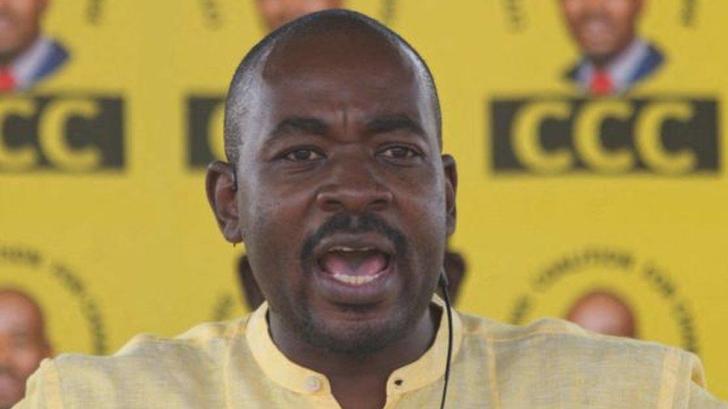News / National
Chamisa ally sounds alarm bells
16 Oct 2023 at 05:23hrs |
3469 Views

A recent tweet by Zimbabwean political activist Freeman Chari, currently based in the United States, has highlighted significant shortcomings in the leadership of Nelson Chamisa within the country's opposition movement. Chari's comments provide a critical evaluation of Chamisa's leadership of the Citizens' Coalition for Change (CCC), raising concerns about the movement's internal dynamics and its approach to challenging the ruling Zanu-PF party.
Chari's critique begins by examining the opposition landscape before the elections, identifying three key groups of supporters namely Chamisa loyalists who back both him and the CCC, CCC supporters who have reservations about Chamisa’s leadership and those who support Chamisa, despite their concerns about CCC's effectiveness, as CCC represents the remnants of the MDC.:
All these groups share the common goal of removing Zanu-PF from power. However, Chari argues that the formation of the CCC was rushed and lacked a clear consensus on its structure, operations, and leadership. He believes this lack of clarity has resulted in significant problems within the movement.
Chari's critique primarily centers on the transition of leadership from the MDC-A to CCC. He contends that this transition created a formless entity marked by a lack of clear responsibilities and accountability. Consequently, decision-making became centralized and inefficient, leading to a decline in the movement's overall functionality.
Furthermore, Chari emphasizes the concentration of decision-making power in the hands of Nelson Chamisa, which he views as detrimental to the movement. Many leaders within CCC prioritize their own parliamentary ambitions over challenging Chamisa publicly, fostering a culture of sycophancy and questionable decision-making.
This lack of clarity, along with the so-called "strategic ambiguity" within CCC, has alienated supporters, prompting some to disengage entirely. Chari also raises concerns about the candidate selection process, which deviated from traditional member voting and resulted in flawed elections that endorsed candidates based on questionable criteria.
Chari's critique also touches on the double standards within CCC, with some MPs rejecting the Presidential election outcome while accepting the parliamentary and local government results. He argues that these double standards harm the movement's integrity.
According to Chari, CCC's present state is marked by confusion and uncertainty. With traditional leaders now occupying positions as mayors, MPs, or councillors, the movement lacks continuity and institutional memory, making it vulnerable to critics of Chamisa's leadership.
Chari acknowledges that those opposing Chamisa do not present a significantly different alternative. However, he questions whether Chamisa has the capacity to lead the effort to rebuild CCC and restore faith in the opposition. He emphasizes the need for a departure from established methods and the inclusion of new voices in leadership.
In conclusion, Chari's critique underscores the increasing demand among opposition supporters for clear direction and reassurance that their investment in the CCC is worthwhile. Chamisa faces the challenging task of addressing these concerns if CCC is to effectively challenge the formidable Zanu-PF party in the future.
Unfortunately for opposition supporters, Chamisa's leadership is criticized for alienating experienced figures like Tendai Biti, Charlton Hwende, and Welshman Ncube in favor of relatively inexperienced individuals like Pashor Sibanda, Takudzwa Ngadziore, and Gift Siziva. This is seen as a loss of intellectual and emotional intelligence needed to unite and grow the party.
Chari's critique begins by examining the opposition landscape before the elections, identifying three key groups of supporters namely Chamisa loyalists who back both him and the CCC, CCC supporters who have reservations about Chamisa’s leadership and those who support Chamisa, despite their concerns about CCC's effectiveness, as CCC represents the remnants of the MDC.:
All these groups share the common goal of removing Zanu-PF from power. However, Chari argues that the formation of the CCC was rushed and lacked a clear consensus on its structure, operations, and leadership. He believes this lack of clarity has resulted in significant problems within the movement.
Chari's critique primarily centers on the transition of leadership from the MDC-A to CCC. He contends that this transition created a formless entity marked by a lack of clear responsibilities and accountability. Consequently, decision-making became centralized and inefficient, leading to a decline in the movement's overall functionality.
Furthermore, Chari emphasizes the concentration of decision-making power in the hands of Nelson Chamisa, which he views as detrimental to the movement. Many leaders within CCC prioritize their own parliamentary ambitions over challenging Chamisa publicly, fostering a culture of sycophancy and questionable decision-making.
Chari's critique also touches on the double standards within CCC, with some MPs rejecting the Presidential election outcome while accepting the parliamentary and local government results. He argues that these double standards harm the movement's integrity.
According to Chari, CCC's present state is marked by confusion and uncertainty. With traditional leaders now occupying positions as mayors, MPs, or councillors, the movement lacks continuity and institutional memory, making it vulnerable to critics of Chamisa's leadership.
Chari acknowledges that those opposing Chamisa do not present a significantly different alternative. However, he questions whether Chamisa has the capacity to lead the effort to rebuild CCC and restore faith in the opposition. He emphasizes the need for a departure from established methods and the inclusion of new voices in leadership.
In conclusion, Chari's critique underscores the increasing demand among opposition supporters for clear direction and reassurance that their investment in the CCC is worthwhile. Chamisa faces the challenging task of addressing these concerns if CCC is to effectively challenge the formidable Zanu-PF party in the future.
Unfortunately for opposition supporters, Chamisa's leadership is criticized for alienating experienced figures like Tendai Biti, Charlton Hwende, and Welshman Ncube in favor of relatively inexperienced individuals like Pashor Sibanda, Takudzwa Ngadziore, and Gift Siziva. This is seen as a loss of intellectual and emotional intelligence needed to unite and grow the party.
Source - Zimbabwe Observer
Join the discussion
Loading comments…


































